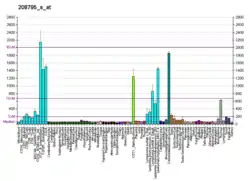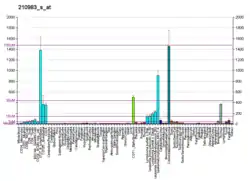MCM7
DNA replication licensing factor MCM7 is a protein that in humans is encoded by the MCM7 gene.[4]
Function
The protein encoded by this gene is one of the highly conserved mini-chromosome maintenance proteins (MCM) that are essential for the initiation of eukaryotic genome replication. The hexameric protein complex formed by the MCM proteins is a key component of the pre-replication complex (pre-RC) and may be involved in the formation of replication forks and in the recruitment of other DNA replication related proteins. The MCM complex consisting of this protein and MCM2, 4 and 6 proteins possesses DNA helicase activity, and may act as a DNA unwinding enzyme. Cyclin D1-dependent kinase, CDK4, is found to associate with this protein, and may regulate the binding of this protein with the tumor suppressor protein RB1/RB. Alternatively spliced transcript variants encoding distinct isoforms have been reported.[5]
Interactions
MCM7 has been shown to interact with:
- CDC45-related protein[6][7]
- CDC6,[6][8]
- Cell division cycle 7-related protein kinase,[6]
- DBF4,[6]
- MCM2,[6][9][10][11][12]
- MCM3,[6][8][9][13]
- MCM4,[9][10][11][14]
- MCM5,[6][9][15]
- MCM6,[6][9][10][11]
- MNAT1,[16]
- ORC1L,[6]
- ORC2L,[6]
- ORC3L,[6]
- ORC5L,[6]
- Replication protein A1,[6]
- Retinoblastoma protein,[17] and
- UBE3A.[18]
See also
References
- GRCh38: Ensembl release 89: ENSG00000166508 - Ensembl, May 2017
- "Human PubMed Reference:". National Center for Biotechnology Information, U.S. National Library of Medicine.
- "Mouse PubMed Reference:". National Center for Biotechnology Information, U.S. National Library of Medicine.
- Nakatsuru S, Sudo K, Nakamura Y (March 1995). "Isolation and mapping of a human gene (MCM2) encoding a product homologous to yeast proteins involved in DNA replication". Cytogenet Cell Genet. 68 (3–4): 226–30. doi:10.1159/000133918. PMID 7842741.
- "Entrez Gene: MCM7 MCM7 minichromosome maintenance deficient 7 (S. cerevisiae)".
- Kneissl M, Pütter V, Szalay AA, Grummt F (March 2003). "Interaction and assembly of murine pre-replicative complex proteins in yeast and mouse cells". J. Mol. Biol. 327 (1): 111–28. doi:10.1016/s0022-2836(03)00079-2. PMID 12614612.
- Kukimoto I, Igaki H, Kanda T (November 1999). "Human CDC45 protein binds to minichromosome maintenance 7 protein and the p70 subunit of DNA polymerase alpha". Eur. J. Biochem. 265 (3): 936–43. doi:10.1046/j.1432-1327.1999.00791.x. PMID 10518787.
- Fujita M, Yamada C, Goto H, Yokoyama N, Kuzushima K, Inagaki M, Tsurumi T (September 1999). "Cell cycle regulation of human CDC6 protein. Intracellular localization, interaction with the human mcm complex, and CDC2 kinase-mediated hyperphosphorylation". J. Biol. Chem. 274 (36): 25927–32. doi:10.1074/jbc.274.36.25927. PMID 10464337.
- Fujita M, Kiyono T, Hayashi Y, Ishibashi M (April 1997). "In vivo interaction of human MCM heterohexameric complexes with chromatin. Possible involvement of ATP". J. Biol. Chem. 272 (16): 10928–35. doi:10.1074/jbc.272.16.10928. PMID 9099751.
- Yabuta N, Kajimura N, Mayanagi K, Sato M, Gotow T, Uchiyama Y, Ishimi Y, Nojima H (May 2003). "Mammalian Mcm2/4/6/7 complex forms a toroidal structure". Genes Cells. 8 (5): 413–21. doi:10.1046/j.1365-2443.2003.00645.x. PMID 12694531. S2CID 27707848.
- You Z, Ishimi Y, Masai H, Hanaoka F (November 2002). "Roles of Mcm7 and Mcm4 subunits in the DNA helicase activity of the mouse Mcm4/6/7 complex". J. Biol. Chem. 277 (45): 42471–9. doi:10.1074/jbc.M205769200. PMID 12207017.
- You Z, Komamura Y, Ishimi Y (December 1999). "Biochemical analysis of the intrinsic Mcm4-Mcm6-mcm7 DNA helicase activity". Mol. Cell. Biol. 19 (12): 8003–15. doi:10.1128/MCB.19.12.8003. PMC 84885. PMID 10567526.
- Fujita M, Ishimi Y, Nakamura H, Kiyono T, Tsurumi T (March 2002). "Nuclear organization of DNA replication initiation proteins in mammalian cells". J. Biol. Chem. 277 (12): 10354–61. doi:10.1074/jbc.M111398200. PMID 11779870.
- Ishimi Y, Ichinose S, Omori A, Sato K, Kimura H (September 1996). "Binding of human minichromosome maintenance proteins with histone H3". J. Biol. Chem. 271 (39): 24115–22. doi:10.1074/jbc.271.39.24115. PMID 8798650.
- DaFonseca CJ, Shu F, Zhang JJ (March 2001). "Identification of two residues in MCM5 critical for the assembly of MCM complexes and Stat1-mediated transcription activation in response to IFN-gamma". Proc. Natl. Acad. Sci. U.S.A. 98 (6): 3034–9. doi:10.1073/pnas.061487598. PMC 30602. PMID 11248027.
- Wang Y, Xu F, Hall FL (October 2000). "The MAT1 cyclin-dependent kinase-activating kinase (CAK) assembly/targeting factor interacts physically with the MCM7 DNA licensing factor". FEBS Lett. 484 (1): 17–21. doi:10.1016/s0014-5793(00)02117-7. PMID 11056214. S2CID 44625458.
- Sterner JM, Dew-Knight S, Musahl C, Kornbluth S, Horowitz JM (May 1998). "Negative regulation of DNA replication by the retinoblastoma protein is mediated by its association with MCM7". Mol. Cell. Biol. 18 (5): 2748–57. doi:10.1128/mcb.18.5.2748. PMC 110654. PMID 9566894.
- Kühne C, Banks L (December 1998). "E3-ubiquitin ligase/E6-AP links multicopy maintenance protein 7 to the ubiquitination pathway by a novel motif, the L2G box". J. Biol. Chem. 273 (51): 34302–9. doi:10.1074/jbc.273.51.34302. PMID 9852095.
Further reading
- Todorov IT, Lavigne J, Sakr F, Kaneva R, Foisy S, Bibor-Hardy V (1991). "Nuclear matrix protein mitotin messenger RNA is expressed at constant levels during the cell cycle". Biochem. Biophys. Res. Commun. 177 (1): 395–400. doi:10.1016/0006-291X(91)91996-P. PMID 1710453.
- Musahl C, Schulte D, Burkhart R, Knippers R (1995). "A human homologue of the yeast replication protein Cdc21. Interactions with other Mcm proteins". Eur. J. Biochem. 230 (3): 1096–101. doi:10.1111/j.1432-1033.1995.tb20660.x. PMID 7601140.
- Mincheva A, Todorov I, Werner D, Fink TM, Lichter P (1994). "The human gene for nuclear protein BM28 (CDCL1), a new member of the early S-phase family of proteins, maps to chromosome band 3q21". Cytogenet. Cell Genet. 65 (4): 276–7. doi:10.1159/000133647. PMID 8258304.
- Hu B, Burkhart R, Schulte D, Musahl C, Knippers R (1994). "The P1 family: a new class of nuclear mammalian proteins related to the yeast Mcm replication proteins". Nucleic Acids Res. 21 (23): 5289–93. doi:10.1093/nar/21.23.5289-a. PMC 310560. PMID 8265339.
- Andersson B, Wentland MA, Ricafrente JY, Liu W, Gibbs RA (1996). "A "double adaptor" method for improved shotgun library construction". Anal. Biochem. 236 (1): 107–13. doi:10.1006/abio.1996.0138. PMID 8619474.
- Fujita M, Kiyono T, Hayashi Y, Ishibashi M (1996). "hCDC47, a human member of the MCM family. Dissociation of the nucleus-bound form during S phase". J. Biol. Chem. 271 (8): 4349–54. doi:10.1074/jbc.271.8.4349. PMID 8626784.
- Schulte D, Richter A, Burkhart R, Musahl C, Knippers R (1996). "Properties of the human nuclear protein p85Mcm. Expression, nuclear localization and interaction with other Mcm proteins". Eur. J. Biochem. 235 (1–2): 144–51. doi:10.1111/j.1432-1033.1996.00144.x. PMID 8631321.
- Kiyono T, Fujita M, Hayashi Y, Ishibashi M (1996). "Cloning of a cDNA encoding a human homologue of CDC47, a member of the MCM family". Biochim. Biophys. Acta. 1307 (1): 31–4. doi:10.1016/0167-4781(96)00057-7. PMID 8652665.
- Ishimi Y, Ichinose S, Omori A, Sato K, Kimura H (1996). "Binding of human minichromosome maintenance proteins with histone H3". J. Biol. Chem. 271 (39): 24115–22. doi:10.1074/jbc.271.39.24115. PMID 8798650.
- Fujita M, Kiyono T, Hayashi Y, Ishibashi M (1997). "In vivo interaction of human MCM heterohexameric complexes with chromatin. Possible involvement of ATP". J. Biol. Chem. 272 (16): 10928–35. doi:10.1074/jbc.272.16.10928. PMID 9099751.
- Yu W, Andersson B, Worley KC, Muzny DM, Ding Y, Liu W, Ricafrente JY, Wentland MA, Lennon G, Gibbs RA (1997). "Large-scale concatenation cDNA sequencing". Genome Res. 7 (4): 353–8. doi:10.1101/gr.7.4.353. PMC 139146. PMID 9110174.
- Hiraiwa A, Fujita M, Nagasaka T, Adachi A, Ohashi M, Ishibashi M (1997). "Immunolocalization of hCDC47 protein in normal and neoplastic human tissues and its relation to growth". Int. J. Cancer. 74 (2): 180–4. doi:10.1002/(SICI)1097-0215(19970422)74:2<180::AID-IJC7>3.0.CO;2-V. PMID 9133452.
- Ishimi Y (1997). "A DNA helicase activity is associated with an MCM4, -6, and -7 protein complex". J. Biol. Chem. 272 (39): 24508–13. doi:10.1074/jbc.272.39.24508. PMID 9305914.
- Sterner JM, Dew-Knight S, Musahl C, Kornbluth S, Horowitz JM (1998). "Negative regulation of DNA replication by the retinoblastoma protein is mediated by its association with MCM7". Mol. Cell. Biol. 18 (5): 2748–57. doi:10.1128/mcb.18.5.2748. PMC 110654. PMID 9566894.
- Suzuki S, Adachi A, Hiraiwa A, Ohashi M, Ishibashi M, Kiyono T (1998). "Cloning and characterization of human MCM7 promoter". Gene. 216 (1): 85–91. doi:10.1016/S0378-1119(98)00323-0. PMID 9714754.
- Kühne C, Banks L (1999). "E3-ubiquitin ligase/E6-AP links multicopy maintenance protein 7 to the ubiquitination pathway by a novel motif, the L2G box". J. Biol. Chem. 273 (51): 34302–9. doi:10.1074/jbc.273.51.34302. PMID 9852095.
- Fujita M, Yamada C, Goto H, Yokoyama N, Kuzushima K, Inagaki M, Tsurumi T (1999). "Cell cycle regulation of human CDC6 protein. Intracellular localization, interaction with the human mcm complex, and CDC2 kinase-mediated hyperphosphorylation". J. Biol. Chem. 274 (36): 25927–32. doi:10.1074/jbc.274.36.25927. PMID 10464337.
- Freeman A, Morris LS, Mills AD, Stoeber K, Laskey RA, Williams GH, Coleman N (1999). "Minichromosome maintenance proteins as biological markers of dysplasia and malignancy". Clin. Cancer Res. 5 (8): 2121–32. PMID 10473096.
- Kukimoto I, Igaki H, Kanda T (1999). "Human CDC45 protein binds to minichromosome maintenance 7 protein and the p70 subunit of DNA polymerase alpha". Eur. J. Biochem. 265 (3): 936–43. doi:10.1046/j.1432-1327.1999.00791.x. PMID 10518787.



